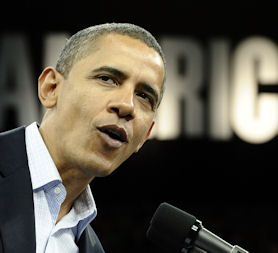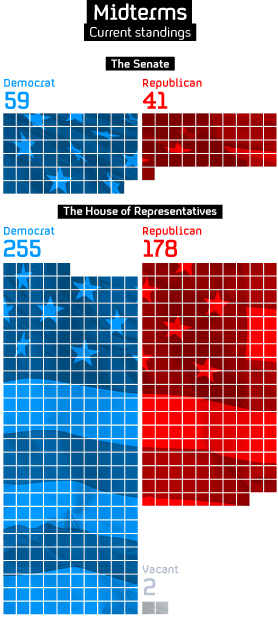Is it Obama or ‘the economy, stupid’?
Congress and to a lesser extent the Senate are up for grabs in tomorrow’s US midterm elections. Jon Snow evaluates Barack Obama’s first two years in office, asking do the electorate really know him?

“We did it!” she cried! “We did it!” 11.00pm Eastern time in America, standing in a hall at Howard University, in the Washington suburbs amid 2000 black students who in one great tidal wave had leapt to their feet at the moment of Obama’s victory almost two years ago today. One girl, tears pouring from her eyes, articulating for all the ecstasy of history and hope chiming.
I have arrived in Washington DC to cover the midterm elections, which perhaps expose an even bigger dilemma for America than that historic moment that culminated in Obama’s victory.
On my way over I re-read the euphoric blogs I posted in those leafy autumn days of hope. They are a true picture of what I witnessed. But intriguingly, beyond the rhetoric they do not identify any more clearly precisely who the main character of the story really is.

Who is Barack Obama?
Who is Barack Obama? Almost two years on we in the outside world are not alone in wondering who America elected on 4 November. It is still an unresolved question inside the United States too.
Above and beyond any other quality, Obama is a campaigner and the men and women in his inner circle have thus far all been campaigners – only one of them had ever held a government post, his Chief of Staff, Rahm Emanuel.
Yet what confronted them was not another campaign, but what I wrote of then: “a challenge of vast proportions – not least the global economic crisis and the conflicts in Iraq and Afghanistan”. The overhang has been long – the challenge, unlike anything since the Great Depression of the 1920’s.
America is hurting. Middle America, middle class America more than most. Travel to Jackson, Michigan – no more middle a place can America boast – and listen to former local legislator, Clark Bisbee “the value of my house has plummeted, the worth of my office building has plunged, my family travel agency has gone out of business, and my once healthy insurance pot has shrunk. I have gone from a net worth of $1.5m, to being under water on everything”.
Bisbee’s experience is the experience of great swathes of America. Many families believe they will never return to what they had. They blame, not the bankers or systems that delivered the crash, but the government for spending too much of their money.
They are angry, frightened too, worried, disappointed, and above all, disillusioned. The focus of their despair is personalised in Obama, but generalised in conventional politics. They have literally lost “hope” in Democrats and Republicans alike.
Republicans like Florida’s Governor Charlie Crist. Once running with a huge lead over any Republican challenging him in last year’s primaries (to choose the candidate who would run for Governor this year), Crist had the money and power backers. But he was overwhelmed by an outsider Marco Rubio – who tells you all you need to know about this year’s mid term elections.
In February last year Obama flew to Florida on the eve of the Congressional vote to inject a staggering $800bn of stimulus into the US economy. Governor Crist backed the bill, and hugged Obama in support of it. Within three months Rubio was running against him for the Republican nomination for Governor. He defined the stimulus as big government spending tax payers’ money in a time when they had none.
Rubio is a key party-goer in the Tea Party. He rubs shoulders with those who espouse virtually no taxes at all, and vastly diminished government. For them Obama is a socialist, whose historic health plan merely consolidates even bigger government.
Hey Presto! Obama and economy in lock step – and any Republican who got anywhere near Obama’s presence on the matter is tainted.
Democrats then are demoralised, whilst their Republican colleagues are at war with one another.
Congress up for grabs
Mr Obama is not a candidate in this election; he stays President for another two years anyway. But the Senate has a third of Senators up for election and the whole of the House of Representatives is up for grabs. The more eccentric elements of the Tea Party have probably ensured that the Republicans will not win the Senate but the Congress could well see the Democrats lose their control. With Tea Party elements elected there, anything could happen.
There are many climate change deniers in the loose, still Republican allied Tea Party, many who want to bring big government to its knees – two areas where the outcome of the election in what is still by a mile the biggest economy in the world, could affect us deeply.
And Obama? Brilliantly bi-racial, intellectual, completely at ease with the elite yet formerly able to connect his rhetoric with the less well off, he does not in the end seem to manifest that Clintonesque interest in “people”. He has disappointed left and right. His “brand” appears fluid in policy terms.
In many ways he has defined the limits of power in the delivery of his rhetorical ambition. America, and we, are at a crossroads – yet again. China, India, and Brazil are moving fast forward, America, Japan and Europe are staggering under the weight of immediate history and the threat of loss of nerve.
It may be the moment for Obama to retrieve something of that victory hope and use his still undoubted powers to do what his hero Lincoln did before him – draw his rivals and those who hate him into his Presidency for the wider good. Consensus is his hidden brand. It is a far cry. But if he loses bad, he may have a bigger chance to harness consensus than had he won. For many in the Republican establishment are as scared of the Tea Party activists as, the Democrats are of the Republicans.
-
Latest news
-
Tim Booth of the band James’ on agism in music, topping the charts and AI6m

-
As India goes to the polls in the world’s largest election – what do British-Indians think?6m

-
Tees Valley: Meet the candidates in one of the biggest contests coming up in May’s local elections4m

-
Keir Starmer says public sector reform will be a struggle7m

-
Nicola Sturgeon’s husband Peter Murrell charged with embezzlement of funds from SNP1m

-




